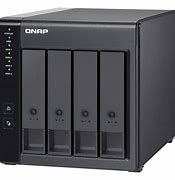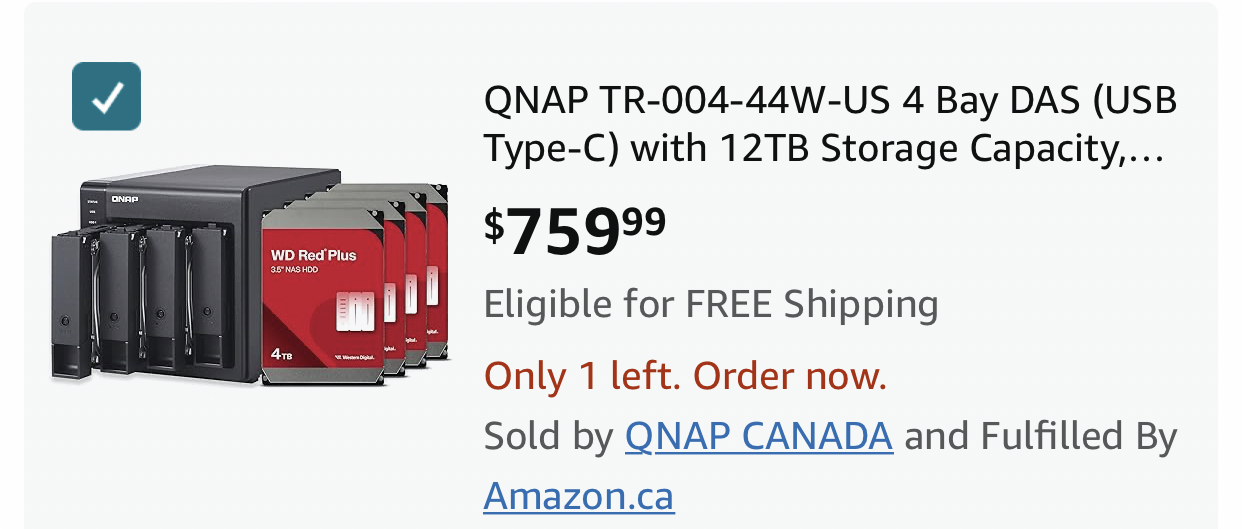In this article I discuss "unboxing" a new storage expansion device for my QNAP NAS. The QNAP TR-004.
In my case I was watching Black Friday and Boxing Day sales and pulled the trigger, grabbing the last expansion drive enclosure available from QNAP Canada preconfigured with 12 TBytes of storage (4 x 4Tbyte WD Red - WD40EFPX-68C6CN0).
QNAP Was Too Good for My Good !!
The RAID device was delivered pre-configured as a Raid 5 device out of the box. The dip switches on the device were set to Raid 5. This is great for someone who wants to get started on a Windows or MAC machine, but I wanted it to be "software managed" using my QNAP TS-453D. Right away I changed the dip switches on the back of the device to "Software Control" thinking that I would be able to manage the device using my QNAP - Storage & Snapshots.
Storage & Snapshots
Storage and Snapshots recognized that the device was in "Software Control" mode, and I added a "thick" volume to the device but right away it said that I required a Firmware Upgrade (to version 1.2.0). The screen was showing that the device had no firmware - just showing dashes: "Firmware Version: --".
I struggled with getting the device to recognize the new firmware. I used the automatic upgrade feature, and it said that it was successful in upgrading the device, but I needed to restart the device and recover the volumes. I did this successfully, but the upgraded firmware version was still not recognized in Storage & Snapshots. I then tried the manual upgrade - downloading the firmware (1.2.0) and upgrading but no luck. I repeated this loop several times and then magically it started to recognize the new firmware. I thought that I was out of the woods but...
RAID 5 Installed Caused Issues
I had assumed that the RAID 5 pre-installed would work fine in Software Controlled mode but then realized that RAID is not RAID. After moving about 4 TBytes of data from my NAS onto the TR-004 in a new volume in a newly created Storage Pool - within 24 hours of use the RAID threw fatal disk errors - stating that it was putting the device into read only mode as 2 disks were not available. This was alarming to say the least but luckily the data was accessible in read only mode and I transferred it back to my NAS - phew.
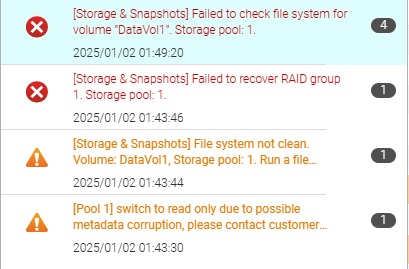
I followed the recovery steps and tried recovering the Storage Pool, but it could not be recovered, and all data was no longer accessible. What Next?...
Re-Initialize the TR-004 into RAID 5 for NAS
With the device now in a wonky state, I decided to completely wipe out and rebuild the RAID and add a new Storage Pool. I used the following steps:
- I removed the Storage Pool from the device
- I removed the existing RAID 5 that came preconfigured on the device
- I safely ejected the device and re-seated all the drives
- I powered back up the device
- I created a new RAID 5 configuration with mode "NAS Storage"
- I created a new "Thick" Volume on the Raid and a new Storage Pool
- I mounted the volume creating a "Shared Folder" using File Station 5
I am now testing the device in this mode - Since I am a bit gun shy on how reliable the Storage Pool will be, I will copy data to it for now and see if it throws any new errors in the coming days...
Copied 4.85 TBytes of data to the TR-004 and will monitor for any issues/errors.
Does Not Support S.M.A.R.T. 👎
After assessing the device more carefully, I was shocked to find out that the TR-004 does not support S.M.A.R.T testing. This is extremely disappointing and I would likely have changed my data storage strategy. I may have even used my old TS-421 as a file share as it would at least allow for disk health insight.
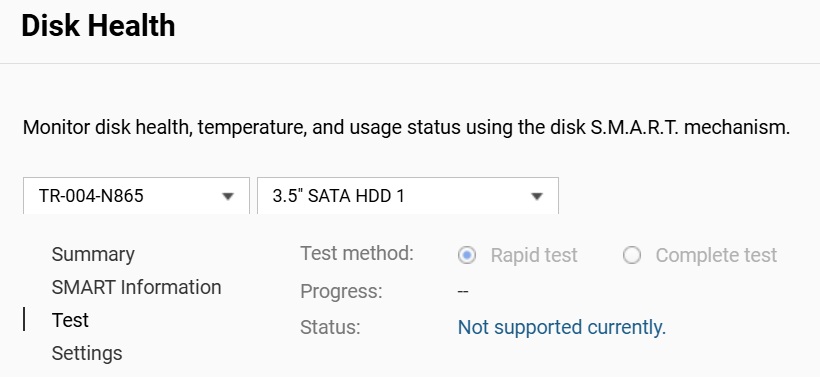
It appears that the TR-004 RAID chip does not support S.M.A.R.T. ATA passthrough to allow for testing the health of the drives. In my opinion, this is a fatal flaw in the design of this device and as a result I do not recommend this as a valid RAID storage expansion device or strategy for those who want to more proactively manage their data storage strategy. Instead, I would recommend spending a little more and purchase a NAS with S.M.A.R.T. and hot swappable drives.
Update
After using the TR-004 for a while I noticed that the device often goes to sleep which times out existing SMB connections. I may need to add a cron job to keep it awake? This may be harder on the drives but gets rid of the nuisance that it takes a long time to "wake up": the device.
- SSH into your qnap.
- Add a simple command "ls /share/{name of share on TR-004}/" to your cron file
- Have it run every 5 minutes.
- Seems to keep it from sleeping.
Have not yet implemented this solution as Device failed yet again....
2025-Jan-20 Update - TR-004 Failed Again
Well... we lasted a few days but then the TR-004 failed again. Putting the volume into read-only mode again. The device has claimed that multiple disks have failed. As a result, I have raised a formal support ticket with QNAP directly. Here are some of the errors.

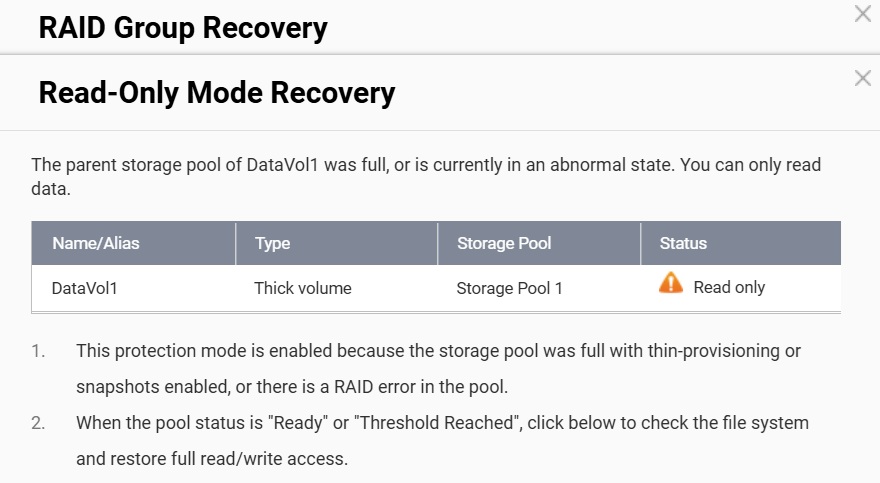

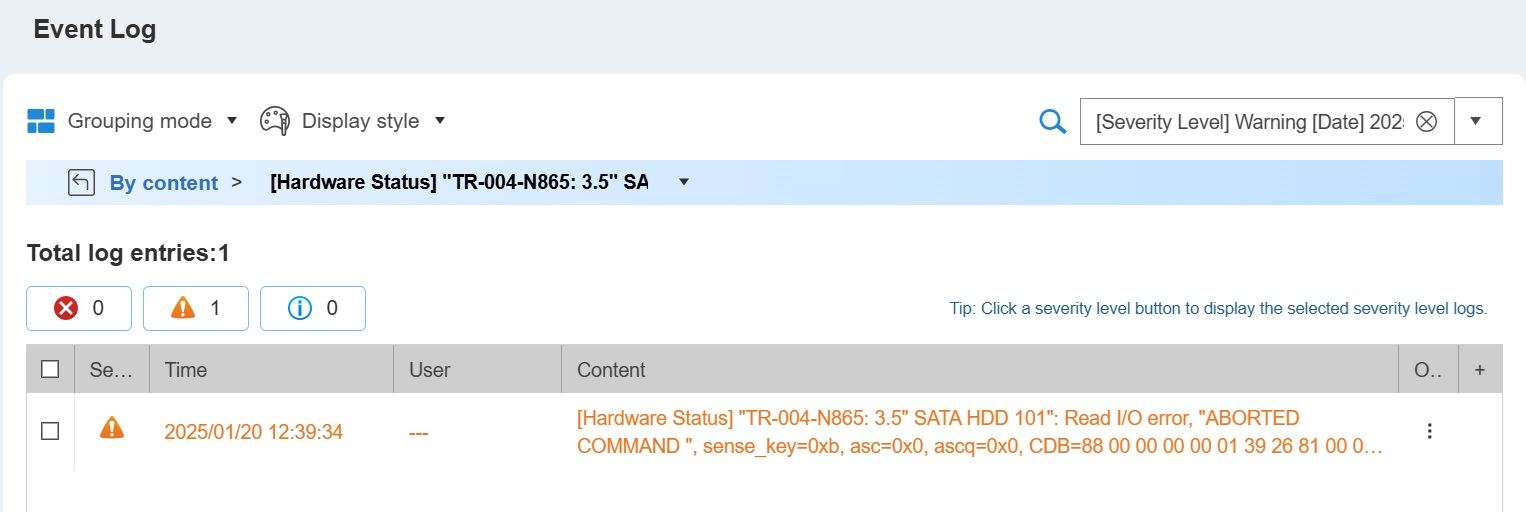
Showing the RAID Group Recovery Popup:
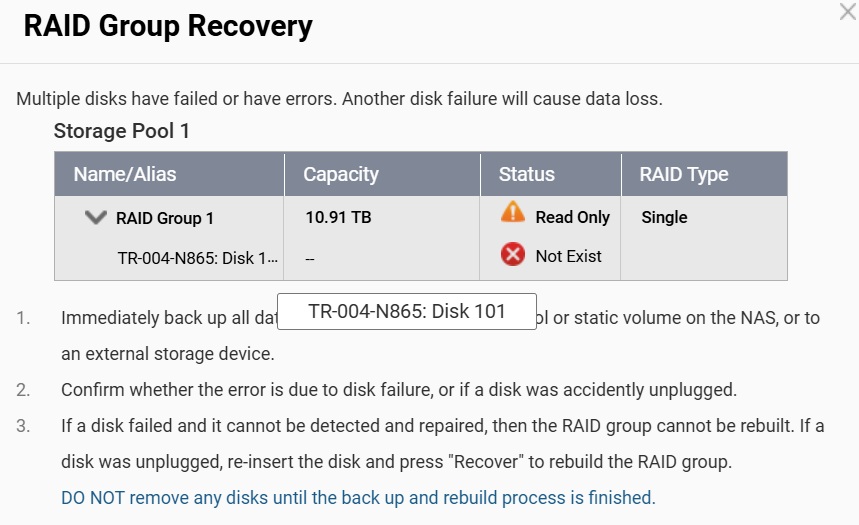
Contacted Amazon
Contacted Amazon in case I have to prepare to return the purchase. According to Amazon I have until Jan 31st to return the defective device. Their advice to is to continue to work with QNAP for couple more days then call them back to do a return if they cannot resolve the issue.
QNAP Ticket Raised - Messages with Support Engineer
- Support Engineer requested a copy of the QNAP log. I supplied the log and the engineer then followed up...
- New Request - "Please run a bad block scan on all the drives in the TR-004. Once completed please extract and send us a fresh batch of diagnostic logs." - However, I am not able to do a "Bad Block Scan" on the TR-004 drives - but option is available on the QNAP drives. Notified Support Engineer and waiting for next steps.
- Next steps for QNAP support is to take full "remote control" of the NAS to do further troubleshooting. I explained that the NAS is not fully exposed to the internet and that there is sensitive data on the NAS that is not easily encrypted/protected and that is not an option.
- QNAP started a RMA process - but when I pushed them on the details, they agreed that the device is a "DOA" device but that they were planning on trying to further investigate and potentially repair the device. I am not comfortable having them send back the device to only have it fail again. This is based on the fact that the device had trouble recognizing the firmware version and/or upgrades as well as randomly claiming that multiple drives have failed and the device randomly goes into read only mode and eventually completely unmounts making the data not retrievable.
- Time to go back to Amazon....
Time to Replace/Return the Device
Unfortunately, the device has too many fundamental issues to be relied upon so I have decided to either replace or return the device. Working with QNAP the agreed at first that the device is being treated as a "DOA" device and stated that they would replace it. QNAP started the RMA process, however when I tried to clarify whether I was getting a replacement device they admitted that they would first analyze the device further and potentially try to fix it. Since I am concerned that this may result in the same issue of it randomly locking out the data volume claiming that multiple drives had failed, I cannot afford to task the risk and went back to Amazon.
I called Amazon, but had to go around a few times (multiple calls on hold for quite some time waiting to be escalated) due to them hanging up, etc. but eventually got my request escalated and they agreed to provide a full return. Once approved, they forgot to send the required shipping label so I had to call back one last time to explain the details of the case yet again - but eventually did get a shipping label.
I removed the data volume from the device, disconnected and boxed up the device in its original packaging - slapped on a label and sent it back (dropped it off at a local Purolator)....
Conclusion - Review of QNAP TR-004
I was really hoping that the QNAP TR-004 would be a robust storage solution option for expanding my current NAS. Having now tried out the device, I have to unfortunately give the device a failing grade. This is based on a few factors:
- The device does not support S.M.A.R.T monitoring for the drives to proactively manage potential end of life failures.
- The device would "sleep" when SMB connected. While this may save energy and potentially extend the life of your drives, it is very problematic when you are using it connected to a media server, etc.
- The device does not handle failures smoothly. In may case (which may be as a result of a defective controller) the device would randomly go into a degraded read-only mode claiming that multiple drives had failed yet the status pages indicated that all 4 drives are green or "good" spinning and operating fine.
Based on these findings, I have to say that this device, or at least my experience with the device, warrants a failing grade and I do not recommend it as a viable QNAP NAS storage expansion option.

